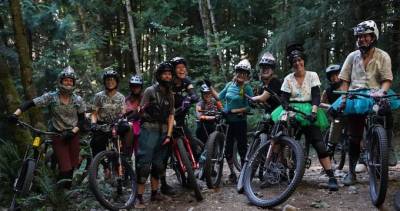B.C.-based Dog Quality and BCIT researchers bring joy to canines' final years
The saddest time in a dog’s life, according to many, is its final years. Aging pooches start to slow down and can struggle with basic tasks such as walking, jumping, and eating. It’s a stage that can cause distress among owners.
Dog enthusiast and project manager Ann-Marie Fleming believes in reconfiguring that mindset.
“I would love if we could change the perspective on senior dogs, [and show people] that it’s this exciting, and fun, and adventurous time of a dog’s life,” she tells the Georgia Straight on the line from the BCIT Burnaby campus. “There’s just something really special about them. They have this lifetime of experience under their belt, so they know exactly who they are and what they like. And then on the other side, I find that there’s something about their vulnerability that creates this really deep bond, and I feel so close to them when they’re at this stage of life.”
After beginning her career as a product manager for financial and software firms, she left her job to pursue the area that had captured her enthusiasm: building a business that catered to elderly dogs.
Her 100 Mile House–based company, Dog Quality, focuses on two big categories—managing incontinence and increasing mobility.
Fleming’s current product line offers ramps, traction socks, and strollers, but the entrepreneur felt something was missing from her catalogue.
“I adore strollers,” she says. “And the reason I love them is because your dog, especially a senior, can walk for as long as they’re capable and then ride when they need the rest. But what happens—and I’m seeing it personally with Lily, my 14-year-old pug—is that those intervals where she’s able to walk and get her exercise are just becoming shorter and shorter. She’s so uncomfortable walking that I feel that she’s riding a lot more.
“Our challenge is that you know exercise is good for them, but you also know it’s difficult,” she continues. “And our thinking is that, just like in the human world, sometimes it’s just a product and assistive device that can help you accomplish that goal. You see it every day—people with their canes and their scooters and their walkers still getting around, but with the help of some type of assistive device. It’s no different with a dog.”
To fill that niche, Fleming connected with BCIT through the National Research Council’s IRAP program, an initiative designed to accelerate the research and development projects of Canadian innovators.
There, she found Silvia Raschke, the project leader at MAKE+, who boasted a background in orthotics, assistive technology design, and canine welfare. Together, they set out to create Fleming’s new product: an effective wheelchair for senior dogs.
“We’re literally trying to solve problems for industry partners,” Raschke tells the Straight, discussing the BCIT program. “We really enjoy partnering with companies that already have access to a market, who understand price points, understand what it is to take something from a prototype and get into manufacturing, and to get it to customers.”
Fleming began the process with an idea of what she wanted the wheelchair to accomplish. Drawing on her own research and experiences, she wanted the device to support dogs even if they had a weak front end or back end, or multiple health conditions. She didn’t want the wheelchair to have leg rings, and it had to be very lightweight and manoeuvrable.
Working with MAKE+ and its iterative design process, the team created a product with a bespoke dog support harness, featherweight frame, and multidirectional wheels generated from months of research with vets and senior-dog owners. Fleming anticipates that the finished product—a chair that will fit all sizes of dogs at an affordable price—will hit the market in mid-2020.
“It’s easy for us to get caught up in the fact that our dog is changing and slowing down,” she says. “If we think it’s a sad time, then the dog will pick up on that energy. So products like this are how we help people continue to have fun together, even if their dog is a senior. Hopefully, a wheelchair like this will help people to enjoy that.”















Comments